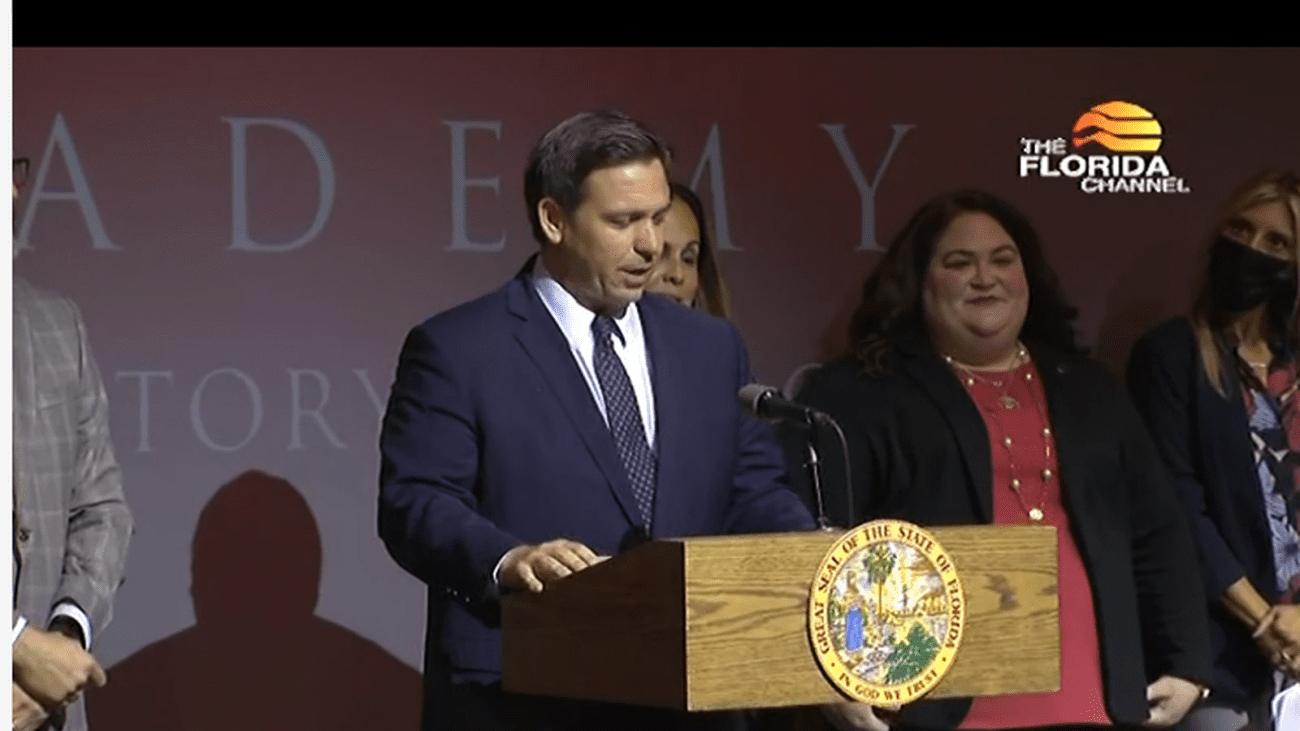
DeSantis calls for an end to annual spring testing in Florida public schools
Miami Herald | By Jeffrey S. Solochek, David Goodhue and Ana Ceballos, Tampa Bay Times | September 14, 2021
The days of preparing and sitting for hours’ worth of spring state tests could be nearing an end for many of Florida’s public school students.
Gov. Ron DeSantis on Tuesday called on lawmakers to eliminate several of the annual exams that students now take, and replace them with thrice-a-year student progress reports whose results would be more timely.
“This will be one of our top priorities in the legislative session,” DeSantis said during a news conference in Doral.
He said the idea would reduce testing in the schools by 75 percent, and would allow for more individualized testing that helps students and teachers make adjustments during the school year while also keeping parents better informed.
Specifically, the progress monitoring would occur three times a year — once each in the fall, winter and spring, DeSantis said.
“This is going to be more student-friendly, this is going to be more teacher-friendly and it going to be more parent-friendly,” DeSantis said from the stage of the Doral Academy, a charter school with a waiting list of around 4,000 students, according to its principal.
ASSESS STUDENTS’ PROGRESS IN ‘HOURS, NOT DAYS’
The governor said that the proposed system will allow individual student progress to be assessed in “hours, not days,” as it does with the current standardized testing.
With the FSA, students take the test at the end of the school year, and the results aren’t in until after students are home for the summer.
“You can’t go back and fix them,” DeSantis said.
DeSantis’ proposal came days before the Legislature begins its pre-session committee weeks, with the Senate Education Committee slated to hold a discussion the afternoon of Sept. 21 on standards and assessments.
TEACHERS, PARENTS, ADMINISTRATORS SUPPORT MOVE
Teachers, administrators and parents welcomed the idea, although concerns were raised about the details in any new legislative initiative.
“Fewer, better state assessments with greater reliance on ongoing, real-time progress monitoring data enable timely academic recalibration opportunities that are right for Florida’s kids,” Miami-Dade Superintendent Alberto Carvalho posted on Twitter shortly after the announcement. “We applaud today’s announcement.”
“It’s exactly what we teachers have been asking for,” said Sarah Painter, Florida’s Teacher of the Year, who works at Eisenhower Elementary in Clearwater. “It’s data in real time rather than through a culminating effort.”
Teachers unions in South Florida echoed those sentiments.
“For 20 years, we have underscored the harmful effect that mandated tests have had on our students and educators’ ability to teach students in a rich and meaningful way,’’ said a statement from United Teachers of Dade, the teachers union in Miami-Dade public schools. “We are glad that the Florida Department of Education has finally listened to the recommendations of education experts and concerned parents and has chosen to eliminate the FSA.”
“We feel like we’ve been heard with this change,” said Holly Hummell-Gorman, president of United Teachers of Monroe. “It allows for much more individualized instruction for each kid.”
Parents called the announcement “the best news” and “a good move” to swerve away from sending money to testing vendors for a product that did little to help students.
Pasco County School Superintendent Kurt Browning called it “a huge shift for school accountability in Florida” and a welcome one, providing “valuable student performance data” will still be collected.
Florida schools have used mid-year testing to help determine where students are succeeding and falling behind for a number of years. The state Department of Education put increased focus on the effort when it asked school districts for their 2020-21 reopening plans, stressing that having student performance data is critical to overcoming any learning deficits.
Last year, many schools were able to predict their spring testing results with accuracy using the model, suggesting that the actual exams — long a source of discontent among many parents and educators — might be redundant.
“I think it’s going to be transformative to how students learn,” Florida Education Commissioner Richard Corcoran said, noting that many have criticized the state’s testing regimen as an “autopsy,” with results coming too late to be helpful. What the governor is proposing is “diagnostic,” he said.
“From April to May, we basically shut down schools for testing,” he said.
PANDEMIC REVEALED FSA TESTS’ ISSUES
He said the standardized tests’ faults became evident during the pandemic, when the FSA results were not counted, but schools were using progress monitoring.
“What we noticed was the FSA is kind of antiquated,” Corcoran said. ”We can take that progress monitoring data and have the exact same accountability system, protect what has been instrumental in our state.”
DeSantis said he expected the state to move to a single progress monitoring platform, so all students are evaluated similarly.
The state cannot completely do away with exams that provide summary information about academic performance without approval from the federal government, which still requires certain data through the Every Student Succeeds Act.
But now could prove a timely opportunity to make changes, as Florida already has been moving away from the Florida Standards Assessments because of its switch to the new BEST standards, which took effect in kindergarten through second grade this year.
PAY ATTENTION TO LEGISLATIVE DETAILS
Florida Education Association president Andrew Spar said the idea had merit, as it could lessen the testing load while still providing plenty of information for evaluating performance. It would measure growth, he noted, because the students sit for progress monitoring more than once during the year.
Of course, Spar noted, the details will have to be worked through. “Our hope is we will work with legislators to try and get it done right,” he said.
If the Legislature runs with DeSantis’ recommendation, it would not be the first time lawmakers have talked about reducing the student testing load since the start of Jeb Bush’s A-Plus Plan more than two decades ago.
They have over the years eliminated some high school math and English tests, for instance, and shifted the testing period to later in the year to allow more time for learning. At the same time, though, they also have added new civics testing requirements, among others.
Even Bush and his education foundation have over time called for “fewer, better tests” to drive the state’s academic accountability and progress.
LEGISLATORS ARE OPEN TO IDEA
DeSantis said he has “gotten great feedback” from Senate President Wilton Simpson, R-Trilby, and House Speaker Chris Sprowls, R-Palm Harbor, as well as from some superintendents.
“I think we’ve hit a real sweet spot here and I think that you’re going to see a lot of support for it,” the governor said.
Republican and Democratic members of the Senate Education Committee are open to the idea of doing away with spring testing.
“I am in favor of it as long as we can have some form of measurement and accountability,” said Sen. Travis Hutson, R-St. Augustine. “I have always said life isn’t about one big test but rather a series of tests and quizzes.”
State Sen. Shevrin Jones, a Broward County Democrat who is vice chairperson of the Senate Education Committee, said the state’s testing system has needed major changes for years.
“I would love for this to be a bipartisan effort for us to reimagine what testing looks like in the state of Florida,” said Jones, a former teacher.






